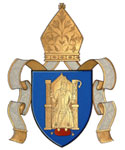 |
 |
News
Anglican Cycle of Prayer remembers the Church of Ireland
Archbishop Michael Jackson.
The Anglican Cycle of Prayer had Anglicans around the world praying for the Church of Ireland during this week.
Here, Archbishop Michael Jackson, the Archbishop of Dublin, Bishop of Glendalough, and Primate of Ireland, introduces his province and suggests pointers for prayer.
'The Church of Ireland has existed in its current form since its disestablishment in 1871 but traces its roots back to St Patrick’s mission in the 5th century. According to the most recent state censuses, 249,000 people in Northern Ireland (2011) and 126,000 people in the Republic of Ireland (2016) are affiliated to the Church. The Church of Ireland is one church whose members live in two distinct political jurisdictions.
'We currently have 1,078 places of worship, organised into 448 parish units and 12 dioceses, each of which is led by a diocesan bishop. The Church is served by around 500 active clergy, supported by lay readers and thousands of volunteers.
The Archbishops of Armagh and Dublin lead their respective provinces and are therefore both titled as primate, with Armagh historically recognised as the most senior see. The current Bishop of Clogher, John McDowell, will be translated as Archbishop of Armagh and Primate of All Ireland on 28 April. A quarter of Church of Ireland members in the Republic live in the Dublin area and St Patrick’s Cathedral, in the city, is our national cathedral.
'The Provincial Secretary, David Ritchie, is known as Secretary General of the Church of Ireland and serves the role as secretary to the Representative Church Body (RCB), the incorporated trustee body of the Church which employs a core staff team based in Dublin and Belfast; effectively the 'civil service' of the Church.
'Lay members have a significant role in the Church’s administration, as shown by their involvement in the RCB and its Executive Committee, led by Henry Saville (Chair) and Graham Richards (Vice-Chair). Under our constitution, the Church operates a model of synodical governance with each parish represented on its diocesan synod. The General Synod: 'the parliament' of the Church which meets annually comprises the House of Bishops and 432 lay members and 216 clerical members, elected by diocesan synods.
'Between each meeting of the General Synod, its business is overseen by its Standing Committee and Honorary Secretaries: Canon Gillian Wharton, Archdeacon George Davison, Ken Gibson and Hazel Corrigan. The General Synod’s key committees cover education, youth work, marriage and families, mission, ministry, liturgy and inter-church relations.
'Our ecumenical and inter-faith relationships build connections between people and provide shared opportunities to influence society. A covenant relationship with the Methodist Church in Ireland, in place since 2002, is manifested in several joint ministries (e.g. a joint chaplaincy team for universities in Belfast).
'As in other European countries, many parishes are experiencing decreasing attendance. However, the Church provides a wide range of styles of worship which can reach the diverse communities of our island. There are increasing opportunities for Christian witness in a society where denominational identities are less important than before but many people are open to spiritual thinking and a religious response to the challenges and the opportunities facing Ireland today, not least a rapidly growing youth population.
'The Church is grateful to God, especially during the Covid 19 pandemic, for those who serve in health and social care services. Many members of the Church of Ireland are directly involved in front line services. Many parishes and dioceses have been able to make use of online services and we look forward to meeting again as gathered worshipping communities when public health guidance permits.
'The Church has also urged all those involved in the UK-EU negotiations to do everything in their power to ensure the continuity of peace, stability and economic security for those on the island of Ireland affected by Brexit.
'Much of our current prayer and action have concerned a response to the coronavirus Covid 19. It has taken some time for a memorandum of understanding to emerge between the Department of Health in the Republic of Ireland and Northern Ireland’s power-sharing administration, pledging cooperation and collaboration in response to the pandemic. There is a recognition that Covid 19 is a global pandemic with local and international footfall.
'Churches and communities have responded positively to continuing and changing pastoral care, regular worship and the other parts of church life as best they can. For us, as for Christians worldwide, this is an Easter like none other.
'In the year 2019-2020, we have been marking 150 years of disestablished life. Disestablishment 150 began in January 2019 with a Youth Forum and has involved seminars and exhibitions along with panel discussions. The Archbishop of Canterbury preached in November 2019 at a service in St Patrick’s Cathedral to mark disestablishment and in his sermon reminded the Church of Ireland of its calling to be a church without borders. Events planned for the remainder of 2020 have been suspended because of the Covid-19 pandemic.'